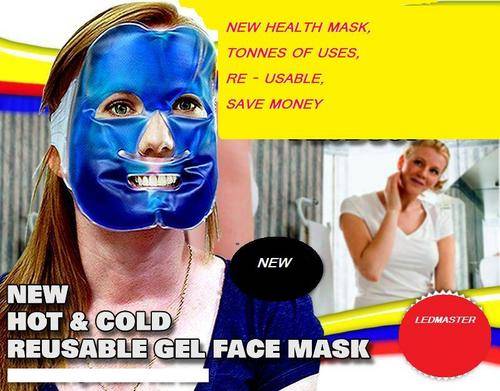
SAVE YOUR LIVERS -NATURAL RE-USABLE HEALTH AND BEAUTY MASK
Check my rate
| Main centres: | 1-3 business days |
| Regional areas: | 3-4 business days |
| Remote areas: | 3-5 business days |

| Main centres: | 1-3 business days |
| Regional areas: | 3-4 business days |
| Remote areas: | 3-5 business days |
When something hurts, we often reach for prescription or over-the-counter pain relievers as a first remedy. Nonsteroidal anti-inflammatory drugs (NSAIDs), such as ibuprofen, aspirin and acetaminophen, however, pose long-term health risks to the stomach and liver. They must be taken in limited quantities and at specific times. Cold therapy, however, is a form of alternative care that works immediately, at any time of day and as often as you like. You can use ice-filled "hot" water bottles and bags of frozen peas, but reusable hot/cold gel packs are the most convenient. Keep them in your refrigerator, and grab one for quick pain relief.
Headaches
Many people treat headaches with a NSAID, but these can be inadequate and even dangerous. Intense or recurrent headache pain, such as sinus headaches or migraines, can benefit from alternative care that addresses the cause of the pain, rather than just the symptoms. Inflamed sinuses or blood vessels near the brain can cause these types of headache pain.
Suppress inflammation with a cold pack. Place a gel packs from the fridge directly on the painful spot on your face, head or neck. This temperature is comfortable and soothing. Wrap ice packs from the freezer in a towel if need be before you put them on your skin. Try 10 minutes of therapy at a time.
Muscle Strains
Inflammation also generates pain when you have strained or torn a muscle. If you regularly participate in sports, you probably want an alternative to pain-relieving pills. Use cold packs on any surface muscle---including the bicep (arm), trapezius (shoulder) and sartorius (leg). You can also use ice packs for lower back discomfort.
Because your muscles may ache as well, you can alternate hot and cold therapy for pain relief.
Painful Joints
Conditions such as osteoarthritis, rheumatoid arthritis and spinal degeneration cause periodic flare-ups of pain due to inflammation around the joints. These are more incidences in which NSAIDs can carry a long-term threat to health.
Use ice packs to target the part of your body that hurts. Apply the cold compress for up to 20 minutes. Alternate heat with cold therapy, if you like, always ending with cold, to discourage inflammation.